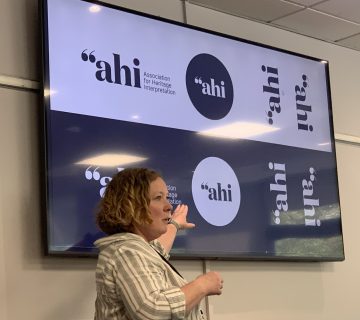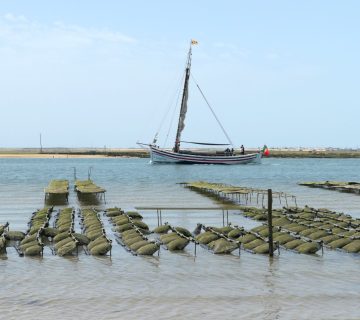Small businesses joined our training module to get inspired by heritage interpretation methods and become Interpretative Hosts!
During the last weekend in September, a group of women gathered in the small city of Ivanić Grad, about 40 minutes’ drive from Zagreb, the capital of Croatia. Ana Gašparović, director of the local tourist board, a passionate tourism and heritage professional, found two farm owners willing to host us, the participants of the IE training Module for Interpretative Host.
This module is perfect for people working in tourism and the hospitality sector close to natural or cultural heritage, as it supports those who want to create meaningful connections between their products and service and heritage phenomenon. We were joined by small tourism businesses, farmers, shop owners, craftsmen, wine and cheese producers and others working with heritage, surrounded by heritage or making products and services inspired by heritage.
We started our training module at the local farm Samo ljuto, which means ‘Only spicy’ where Martina and Slaven, with a little help from their two daughters, grow different sort of peppers and paprikas to make sauces, spicy, sweet and chili, and the most delicious ajvar, a sauce made of smashed grilled red bell peppers and eggplants. Perfect to match with grilled meat.
After tasting the sauces, we moved to the donkey farm Magareće mlijeko or ‘Donkey Milk’, where our host Neven welcomed us and showed around. Unfortunately, we didn’t get to taste any donkey milk though.
The first day we spent mostly outside on the farms. We invited the owners to do some exercises with us. We were their guests and getting to know our guests and their values is important in thinking how to interpret the heritage they cherish and link it with the product they offer. The end result of their work is a product they want to sell to guests but it is the process of making it that broadens our horizons, connects us with each other and our heritage. We were all searching for deeper meaning and trying to offer different paths to it. The method of the interpretive triangle helped us to shape our thoughts and match them to the talk.
Our trainer ensured that we had different activities and worksheets to implement the four qualities of the IE training programme.
We were happy to see our hosts join in on activities and commenting afterwards that it was interesting, inspiring and useful. They expressed the wish to participate in a similar workshop or training.
Our second day of the training was spent in Zagreb, at my place in Doremiza, where we continued to work on interpretive techniques, group activities, discussions, constructive peer evaluation and exchange of ideas.
Each of us brought some home-made product on which we had to make an interpretive talk and text.
During these two days discussing and sharing experiences, we learned from each other and the heritage we brought with us. We let heritage connect us, embrace us and make us more mindful to each other. And we had so much fun in doing it! I was happy to host another IE trainer and heritage interpretation fellows in my home in Zagreb.
‘Til we interpret again!
Special thanks to:
Tourist Board City of Ivanić Grad https://www.tz-ig.com/
OPG Magareće mlijeko, https://magare.hr/
OPG Samo ljuto, https://opgbarisec.hr/
Ivana Jagić Boljat for organising
Janja Sivec for delivering the training
Iva Caleta Plesa is a tourist guide for Zagreb, a French and Russian language teacher, museologist and heritage interpreter. She is an IE Certified Interpretive Guide and Certified Trainer. Together with her husband, she runs Doremiza (www.doremiza.com), a small creative space for workshops, photo sessions, lectures and meetings. She can be contacted at: ivacaleta@gmail.com.
To cite this article: Plesa Caleta, Iva (2023) ‘Interpreting red hot chilli peppers and a donkey farm‘ in Interpret Europe Newsletter 4-2023, pg.8.
Available online: https://interpret-europe.net/wp-content/uploads/2023/12/IE-Newsletter-2023_4-winter.pdf




